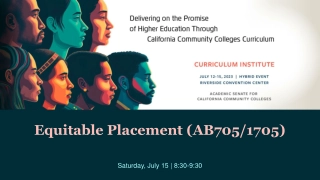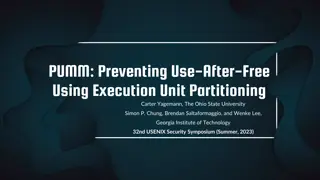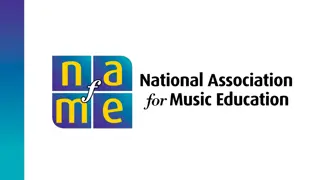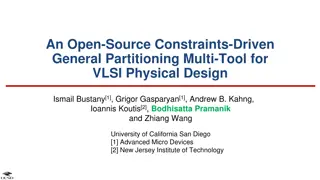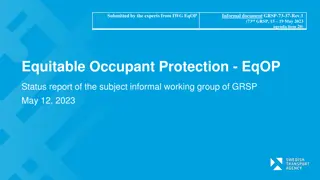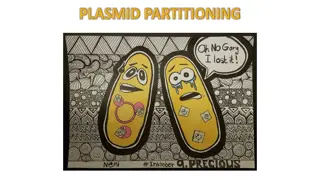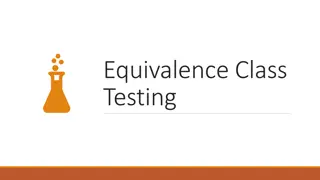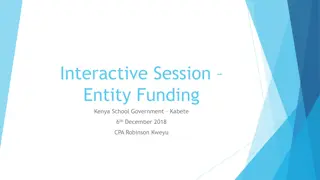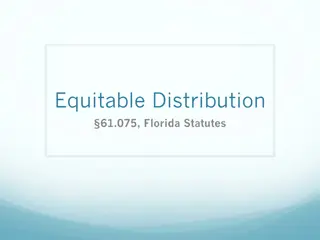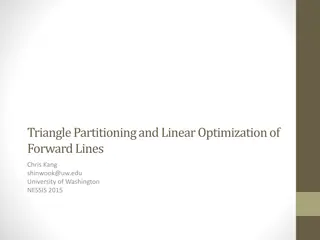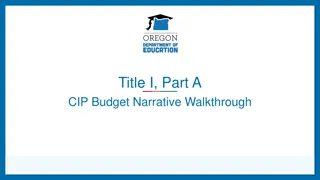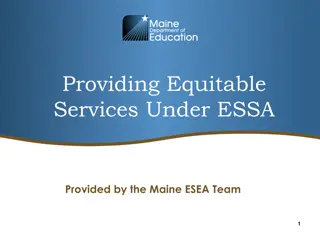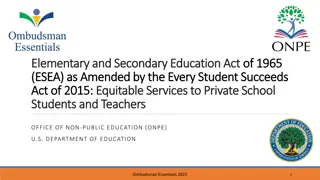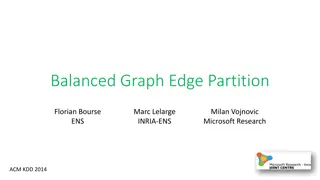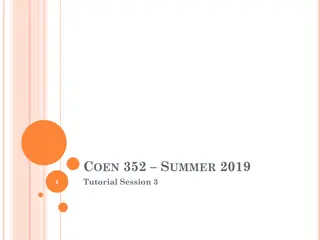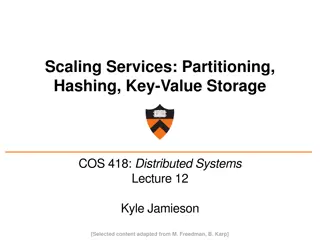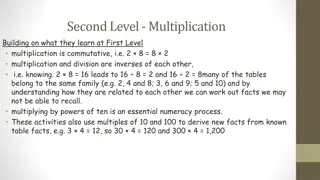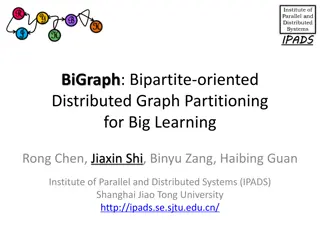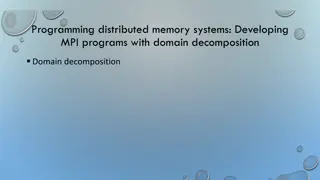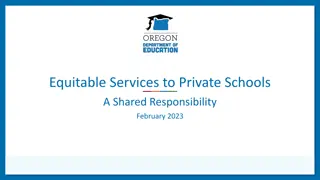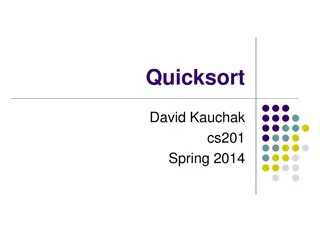Using Diverse, Equitable, and Inclusive Strategies for Student Success
How Houston Community College implements diverse, equitable, and inclusive strategies to improve student success and create an inclusive learning environment.
0 views • 27 slides
Equitable Placement Strategies for Student Success
Explore the impact of AB 1705 on student placement and enrollment, as outlined by the California Community Colleges Chancellor's Office. Join the session to discuss challenges, share successes, and strategize innovations to enhance student success and close equity gaps. Learn about the ASCCC paper o
0 views • 16 slides
Grading for Equity Independent Study Program
Explore the concepts of equitable grading with a focus on historical context, bias recognition, and motivational elements. Join thought partners in studying Joe Feldman's book to transform grading practices for all students. Engage in live facilitated discussions and sessions to delve into the princ
3 views • 11 slides
ICC Renewable Energy Access Workshop Overview
The ICC Renewable Energy Access Plan workshops aim to discuss the implementation of CEJA (Climate and Equitable Jobs Act), focusing on clean energy goals and renewable energy transitions in Illinois. The workshops provide insights, analysis, and opportunities for stakeholder feedback to ensure a jus
3 views • 31 slides
PUMM: Preventing Use-After-Free Using Execution Unit Partitioning
Memory-unsafe languages like C and C++ are prone to Use-After-Free (UAF) vulnerabilities. PUMM introduces execution unit partitioning to efficiently tackle this issue. By segregating and managing execution units, PUMM aims to prevent UAF exploits and enhance software security.
0 views • 31 slides
NAfME: Empowering Music Educators for Equitable Access
Collaborate with NAfME, a supportive community advocating for equitable music education access. Experience a diverse association where everyone is valued, heard, and included in their musical journey. Discover the transformative power of music, connecting people across cultures and time, fostering c
2 views • 19 slides
Equitable Services for Private School Children and Teachers
The Elementary and Secondary Education Act of 1965, specifically Title VIII, Part F, outlines the provision of equitable services for eligible private school children, teachers, and other educational personnel. This non-regulatory guidance emphasizes the importance of ensuring fairness and support f
4 views • 32 slides
Open-Source General Partitioning Multi-Tool for VLSI Physical Design
An open-source tool called TritonPart offers a constraints-driven approach for general partitioning in VLSI physical design. It replaces hMETIS and is integrated with OpenROAD, providing features like multi-way partitioning and embedding-aware techniques. TritonPart shows significant improvements ov
1 views • 20 slides
Enhancing Education Through Family and Community Engagement
Inclusive and equitable education is achieved through effective family and community engagement, which positively impacts student achievement. Engagement dimensions include providing a secure environment, intellectual stimulation, and active participation in school activities. Building equitable rel
0 views • 8 slides
Progress Report on Equitable Occupant Protection Working Group
The Informal Working Group on Equitable Occupant Protection (IWG EqOP) has made significant strides in enhancing the safety and protection of a diverse population, focusing on passenger car occupants. The IWG's workplan includes tasks related to regulatory changes, addressing diversity issues, and a
0 views • 12 slides
Understanding Plasmid Partitioning Mechanisms in Bacteria
The stable maintenance of low-copy-number plasmids in bacteria relies on partition mechanisms that ensure proper positioning during cell division. Different from high-copy-number plasmids, which rely on random diffusion, low-copy-number plasmids require regulated partitioning mechanisms to prevent d
0 views • 14 slides
Equitable Grading Practices: Pillars, Zero Policies, and Minimum Grading
Explore the three pillars of equitable grading: accuracy, bias-resistance, and motivation. Learn about the impact of giving zeros on student grades and discover alternative approaches. Delve into the concept of minimum grading and how adjusting grading scales can enhance student engagement and succe
1 views • 48 slides
Year 2 Mathematics Week 1: Addition Practice
In Year 2 Mathematics Week 1, students will be practicing addition of two-digit numbers using methods like partitioning into tens and ones and the expanded column method. Parents are encouraged to help and show different methods to their children, such as drawing dienes or using squared paper for la
1 views • 10 slides
Understanding Equivalence Class Testing and Its Application in Software Testing
Equivalence class testing is a software testing technique that involves dividing input values into classes for effective testing coverage. Equivalence classes are defined mathematically as subsets of a given set, ensuring partitioning and mutual exclusivity. By applying equivalence partitioning, tes
1 views • 21 slides
Understanding Azure Cosmos DB Partitioning
Learn how Azure Cosmos DB leverages partitioning to automatically scale data globally. Discover the importance and types of partitioning, logical and physical partitions, best practices, and more.
0 views • 24 slides
Memory Management Techniques in Operating Systems
Operating systems employ various memory management techniques such as fixed partitioning, dynamic partitioning, paging, segmentation, and virtual memory to efficiently utilize memory resources. These techniques help in organizing memory allocation for programs, managing fragmentation, and optimizing
0 views • 17 slides
County Government Revenue Sources and Allocation in Kenya
The county government revenue in Kenya is sourced from various avenues such as property rates, entertainment taxes, and service charges. Equitable share forms a significant part of this revenue, allocated based on a formula developed by the Commission on Revenue Allocation. The funds given through t
0 views • 14 slides
Rowan University DEI Strategic Action Plan Overview
Rowan University emphasizes diversity, equity, and inclusion (DEI) through its strategic action plan, aiming to create a more inclusive and equitable campus community. The plan involves assessing departmental strengths and areas for improvement, setting goals and objectives, and engaging all faculty
1 views • 15 slides
Private Schools: CARES Act Equitable Services Overview
This session introduces and discusses the implications of the CARES Act Equitable Services for private schools, including a timeline of events, court decisions, and implications for districts and private schools. The presentation covers the requirement for LEAs to provide equitable services to non-p
2 views • 12 slides
Understanding Equitable Distribution in Florida
Equitable distribution in Florida, governed by statutes 61.075 and 61.076, determines the fair division of marital assets and liabilities in divorce cases. Key considerations include identification, valuation, distribution presumption, and justification for unequal distribution. Assets are classifie
0 views • 28 slides
Understanding Equitable Services to Independent Schools
Explore the guidelines for providing federal education aid to students in need attending independent schools, as mandated by the Elementary and Secondary Education Act. Learn about eligibility criteria, consultation processes, and funding allocation. Discover the complexities of Title I eligibility
0 views • 46 slides
Triangle Partitioning and Linear Optimization in Hockey Line Analysis
In this presentation, the speaker discusses the use of triangle partitioning and linear optimization techniques to analyze hockey team lines. The goal is to find chemistry between players, allocate ice time effectively, and match up against opposing lines for a better chance of winning games. Tradit
0 views • 16 slides
Understanding Title I, Part A CIP Budget Narrative Requirements
This walkthrough explains the purpose of Title I, Part A funds, focusing on providing equitable education opportunities and addressing achievement gaps for students in need. It covers important aspects such as the Supplement Not Supplant rule, federal funds timeline, and consultation for equitable s
1 views • 26 slides
Equitable Services Requirements and Guidelines under ESSA
Equitable Services Requirements and guidelines under ESSA outline the responsibilities of education officials, ombudsman, and private school administrators to ensure fair distribution of federal funds. The ESEA Team in Maine works to uphold Title I, Part A, Migrant Education, Teacher Quality, Englis
0 views • 56 slides
Education Act of 1965 and Equitable Services for Private School Students
The Elementary and Secondary Education Act (ESEA) of 1965, as amended by the Every Student Succeeds Act in 2015, ensures equitable participation of private school students and teachers in federal education programs. The Office of Non-Public Education (ONPE) oversees this initiative, providing resour
0 views • 30 slides
Enhancing Equitable Health Product Roll-out in Low- and Middle-Income Countries
Strategies to enhance equitable access to health products in low- and middle-income countries will be discussed at the AIDS 2022 conference, focusing on key factors such as availability, acceptability, affordability, accessibility, and quality. The Medicines Patent Pool aims to increase access to in
0 views • 14 slides
Balanced Graph Edge Partition and Its Practical Applications
Balanced graph edge partitioning is a crucial problem in graph computation, machine learning, and graph databases. It involves partitioning a graph's vertices or edges into balanced components while minimizing cut costs. This process is essential for various real-world applications such as iterative
0 views • 17 slides
Introduction to QuickSort Algorithm
Explore the QuickSort algorithm with details on the worst-case time complexity, partitioning process, recursive method, and example scenarios. Understand how QuickSort efficiently sorts arrays by choosing a pivot, comparing elements, and recursively partitioning the array until sorted. Dive into the
0 views • 19 slides
Scaling Services and Key-Value Storage Techniques
This content delves into various aspects of scaling services, including partitioning, hashing, and key-value storage. It discusses vertical and horizontal scalability, the chaotic nature of horizontal scaling, techniques for partitioning data, and case studies like Amazon Dynamo. The importance of p
0 views • 48 slides
Exploring Advanced Multiplication Concepts Through Arrays and Partitioning
Delve into the intricacies of multiplication through hands-on activities using arrays, partitioning, and understanding the commutative property. Discover how arrays can help visualize multiplication, learn to partition numbers for easier calculations, and grasp the concept of multiplying by powers o
0 views • 17 slides
Fun Math Activity: Number Partitioning with Whiteboards
Get your whiteboards ready for a fun math activity on number partitioning! Practice partitioning numbers into ones and tens, then solve equations by adding the ones and tens separately. Check out the examples provided to understand the concept better.
0 views • 58 slides
BiGraph: Bipartite-Oriented Distributed Graph Partitioning for Big Learning
BiGraph is a distributed graph partitioning algorithm designed for bipartite graphs, offering a scalable solution for big data processing in Machine Learning and Data Mining applications. The algorithm addresses the limitations of existing partitioning methods by efficiently distributing and managin
0 views • 45 slides
Developing MPI Programs with Domain Decomposition
Domain decomposition is a parallelization method used for developing MPI programs by partitioning the domain into portions and assigning them to different processes. Three common ways of partitioning are block, cyclic, and block-cyclic, each with its own communication requirements. Considerations fo
0 views • 19 slides
Factors Affecting Photosynthetic Efficiency in Oil Palm Plantation
All green plants, including oil palm, rely on photosynthesis to convert carbon dioxide and water into carbohydrates using solar radiation. Key factors influencing oil palm productivity include solar radiation availability, radiation absorption by the canopy, conversion efficiency, dry matter partiti
0 views • 20 slides
Equitable Services to Private Schools: Shared Responsibility and Requirements
Equitable services to private schools involve federal programs supported by tax dollars, allowing all children and teachers access to various educational programs. Private schools must be not-for-profit to qualify. Consultation plays a crucial role in reaching agreements on providing equitable and e
0 views • 17 slides
Understanding the Quicksort Algorithm
Quicksort is a widely used sorting algorithm that operates by partitioning an array into smaller subarrays. The `public.static.int.partition` method plays a crucial role in Quicksort by selecting a pivot element and rearranging elements around it based on their values. This process creates a split b
0 views • 50 slides
Understanding Clustering Algorithms in Data Science
This content discusses clustering algorithms such as K-Means, K-Medoids, and Hierarchical Clustering. It explains the concepts, methods, and applications of partitioning and clustering objects in a dataset for data analysis. The text covers techniques like PAM (Partitioning Around Medoids) and AGNES
0 views • 74 slides
Rectangular Dissections and Edge-Flip Chains in Lattice Triangulations
Explore equitable rectangular dissections and their applications in VLSI layout, graph mapping, and combinatorial problems in this scholarly work by Dana Randall from Georgia Institute of Technology. Discover the concept of partitioning an n x n lattice region into n2/a rectangles or areas where cor
0 views • 32 slides
Optimal Round and Sample-Size Complexity for Parallel Sorting Partitioning
This paper explores optimal round and sample-size complexity for partitioning in parallel sorting, discussing parallel partitioning approaches such as sampling and histogramming. It presents a model where processors communicate a set number of keys per round, highlighting the trade-off between round
0 views • 18 slides
Partitioning and Purification of Carboxymethyl Cellulase in Aqueous Biphase System
Cellulases enzymes are essential in various industries and purifying them is crucial for understanding their properties. Conventional techniques along with aqueous biphasic systems like liquid-liquid fractionation are used for extraction and separation. The latter enables selective partitioning of b
0 views • 22 slides

